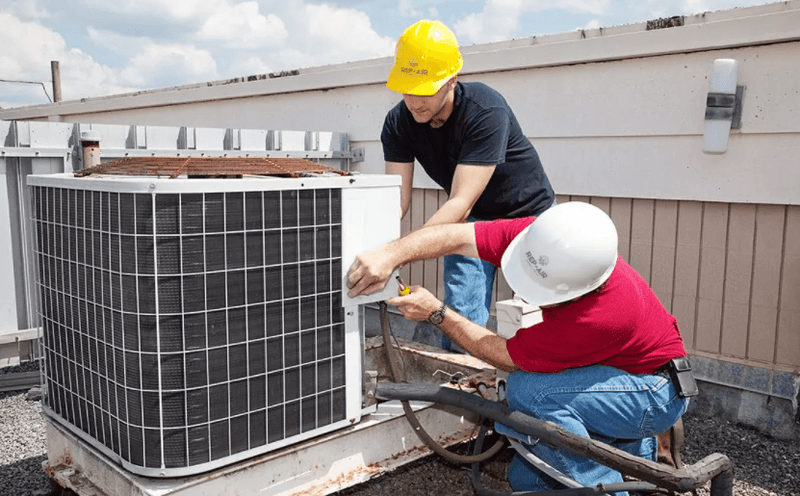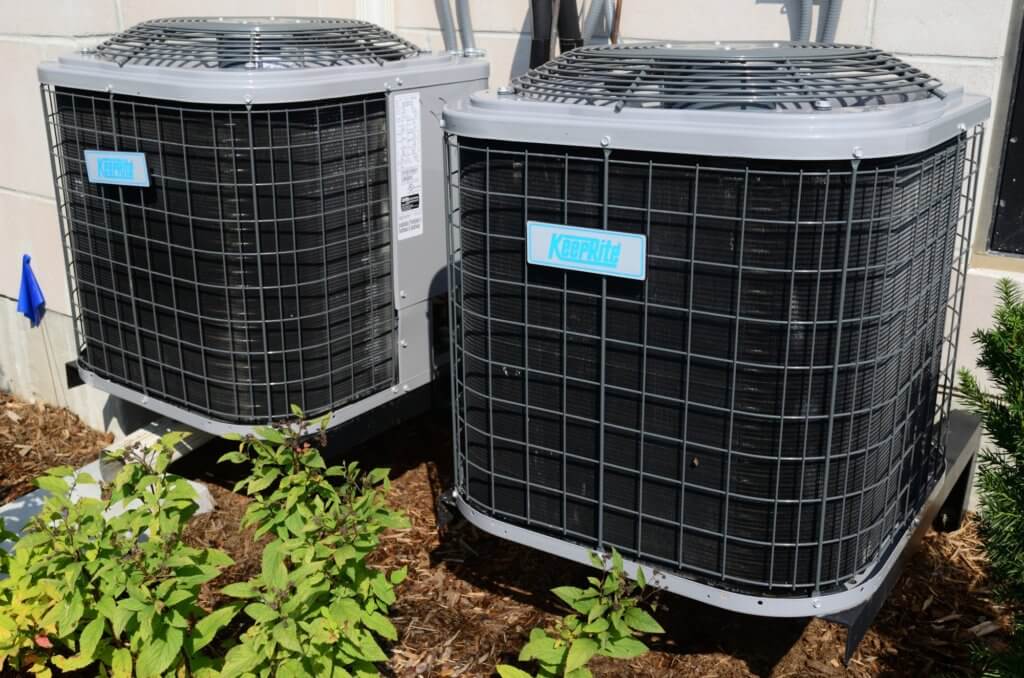Discovering the Necessary Parts of an Efficient Heating And Cooling System
An efficient a/c system is built on several critical components that operate in consistency. Each part, from the thermostat to the ductwork, plays a crucial function in keeping comfort and power effectiveness. Recognizing these aspects is essential for enhancing efficiency and enhancing interior air top quality. As one checks out these components, the elaborate relationships between them expose understandings into enhancing overall system performance. What specific elements add most to this performance?
The Duty of the Thermostat in Heating And Cooling Efficiency
Usually ignored, the thermostat plays a critical role in the performance of Cooling and heating systems. This small device functions as the key control facility, managing temperature setups and making certain suitable comfort within a space. By accurately picking up the ambient temperature, the thermostat connects with the air, home heating, and ventilation conditioning devices to keep the desired environment
A reliable thermostat minimizes energy intake by triggering the cooling and heating system just when required, thus stopping extreme home heating or air conditioning. Modern clever and programmable thermostats improve this effectiveness further by enabling customers to establish timetables and remotely adjust settings, adjusting to daily routines.
The positioning of the thermostat is crucial; incorrect location can lead to unreliable temperature level readings, resulting in ineffective operation. Generally, a well-functioning thermostat not just enhances convenience however additionally adds markedly to energy cost savings and the long life of the cooling and heating system.
Recognizing the Significance of Air Filters
Air filters offer an essential feature in a/c systems by assuring that the air distributing within a space remains tidy and healthy and balanced. These filters trap dust, irritants, and various other toxins, preventing them from being recirculated throughout the setting. By capturing these bits, air filters contribute to improved indoor air top quality, which can considerably benefit passengers' wellness, particularly those with allergic reactions or respiratory system problems.
Additionally, maintaining clean air filters boosts the efficiency of heating and cooling systems. Clogged up filters can restrict airflow, triggering the system to function harder to preserve preferred temperature levels, bring about enhanced energy intake and greater utility costs. Consistently replacing or cleaning up filters is an essential maintenance action that can extend the life expectancy of HVAC tools. Ultimately, comprehending the significance of air filters enables homeowners and structure supervisors to take proactive steps to guarantee a well-functioning, effective heating and cooling system that promotes a comfy and risk-free indoor atmosphere.

The Capability of the Furnace and Warm Pump
Furnaces and heat pumps are critical components of HVAC systems, liable for supplying warmth throughout cooler months. Heating systems run by home heating air via burning or electrical resistance, then dispersing it throughout the home using air ducts. They typically supply fast heating and can be fueled by gas, electrical energy, or oil, relying on the system type.
On the other hand, warmth pumps move warmth as opposed to create it. They draw out warm from the outdoors air or ground, even in reduced temperatures, and move it inside. HVAC experts. This double functionality permits heatpump to additionally offer cooling in warmer months, making them flexible choices for year-round environment control
Both systems call for correct upkeep to assure effectiveness and durability. While furnaces master severe chilly, heatpump can be beneficial in modest climates. Recognizing their distinct functionalities help home owners in selecting one of the most suitable choice for their home heating requires.
Discovering the Air Conditioning System
The air conditioning system is an essential part of HVAC systems, available in different types to fit various demands. Recognizing the effectiveness ratings of these systems is crucial for making notified options regarding energy consumption and price. This area will discover the varied kinds of ac system and clarify how effectiveness scores effect efficiency.
Types of Air Conditioners
While numerous elements influence the choice of a/c systems, recognizing the various kinds readily available is critical for homeowners and see post structure supervisors alike. Central air conditioning conditioners are made to cool whole homes or buildings, utilizing a network of ducts for airflow. Home window devices provide a more local solution, suitable for single spaces or little areas. Mobile ac unit provide versatility, allowing customers to relocate the device as needed. Ductless mini-split systems are one more alternative, combining the efficiency of main systems with the convenience of zoning, as they call for no ductwork. Lastly, geothermal systems harness the planet's temperature for energy-efficient air conditioning. Each type features distinctive benefits, making informed options necessary for reliable climate control.

Performance Rankings Explained
Understanding performance rankings is essential for choosing the ideal a/c unit, as these metrics give insight right into the system's performance and energy consumption. The most common score for air conditioning system is the Seasonal Energy Efficiency Ratio (SEER), which determines the cooling result during a regular air conditioning season split by the click for more total electrical energy input. A higher SEER shows far better efficiency. In addition, the Energy Performance Ratio (EER) is made use of for determining efficiency under certain problems. One more vital metric is the Energy Celebrity qualification, which symbolizes that a device satisfies rigorous energy efficiency guidelines. By examining these scores, consumers can make educated choices that not only maximize convenience yet also lower energy prices and ecological influence.
The Relevance of Ductwork and Airflow
Reliable ductwork design and airflow management play important roles in the overall efficiency and performance of HVAC systems. Appropriate ductwork assurances that conditioned air is dispersed uniformly throughout an area, minimizing temperature level variations and boosting comfort. Properly designed ducts decrease resistance to air movement, lowering the workload on HVAC tools and inevitably lowering power intake.
Air movement administration entails strategically positioning vents and registers to boost the flow of air. This avoids common problems such as chilly or warm areas, which can take place when air flow is blocked or inadequately well balanced. Additionally, the ideal duct products and insulation can even more improve efficiency by reducing warmth loss or gain throughout air transportation.
A reliable ductwork system not just adds to power savings but can likewise lengthen the life expectancy of HVAC equipment by minimizing unneeded stress (HVAC experts). Understanding the significance of ductwork and air movement is crucial for accomplishing peak Heating and cooling system efficiency.
Regular Maintenance Practices to Enhance Efficiency
Regular maintenance methods are essential for making sure peak efficiency of cooling and heating systems. These methods include routine inspections, cleaning, and required repair services to maintain the system running effectively. Frequently altering air filters is important, as clogged filters can block airflow and lower efficiency. Furthermore, professionals ought to examine and clean evaporator and condenser coils to stop getting too hot and energy waste.
Annual specialist examinations are also advised, as skilled technicians can recognize prospective issues before they intensify. Oiling moving components decreases deterioration, adding to a longer life-span for the system. Making certain that the thermostat functions appropriately aids in maintaining perfect temperature control.
Often Asked Questions
Just how Commonly Should I Replace My Thermostat?
Thermostats need to typically be replaced every 5 to one decade, relying on use and technology innovations. Routine checks are advisable to ensure peak efficiency, particularly if experiencing irregular temperature control or boosted energy expenses.
What Size Air Filter Is Ideal for My HVAC System?
The most effective dimension air filter for an a/c system differs by system style. Normally, it's essential to seek advice from the owner's guidebook or check the existing filter measurements More Info to ensure peak performance and air quality.
Can I Set Up a Warm Pump Myself?
Setting up a warmth pump individually is feasible for skilled people, however it requires expertise of electrical systems and neighborhood codes. Employing a professional is advised to ensure proper setup and suitable system performance.
Just how Do I Know if My Ductwork Is Efficient?
To identify ductwork effectiveness, one should check for leakages, measure airflow at vents, evaluate insulation high quality, and review temperature level differences in between supply and return air ducts. Specialist analyses can give detailed understandings into total performance.
What Are Indicators My Cooling And Heating Needs Immediate Upkeep?
Signs that a heating and cooling system requires prompt upkeep consist of uncommon sounds, irregular temperatures, enhanced power costs, undesirable odors, and constant cycling. Attending to these issues immediately can prevent additional damage and warranty peak system efficiency.
Air filters serve a necessary feature in Heating and cooling systems by assuring that the air circulating within a space stays tidy and healthy and balanced. Furthermore, maintaining tidy air filters boosts the effectiveness of HVAC systems. Ductless mini-split systems are an additional option, integrating the performance of central systems with the convenience of zoning, as they call for no ductwork. Recognizing performance ratings is necessary for selecting the best air conditioning unit, as these metrics supply insight right into the system's efficiency and energy consumption. The ideal dimension air filter for an A/c system varies by device layout.